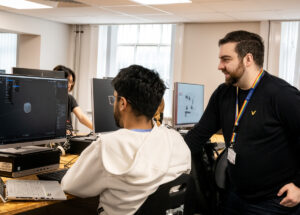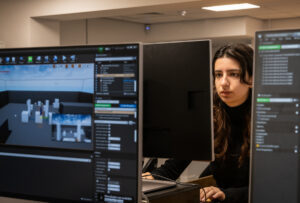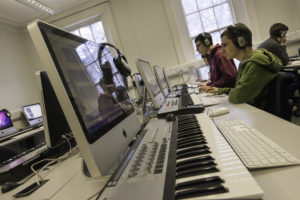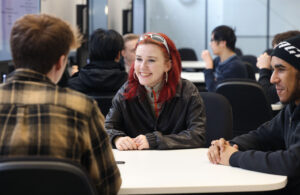Game Design
UCAS code I610
- Study mode
- Full-time
- Duration
- 3 years
- Start date and application deadlines
-
- Start date
UCAS code I610
Game Design BSc combines coding, creativity, and critical theory to deliver a distinctive new provision in interactive audiovisual media. This interdisciplinary programme is one of the first of its kind in the Russell Group, combining modules from Computer Science and the School of the Arts to deliver a holistic grounding in how games are made, why they’re made, and what they tell us about the world.
You will develop skills in coding and programming, games scholarship, and creative design through a combination of modules from Communication & Media, Computer Science, English, Music, and Philosophy. These individual disciplines are drawn together by a set of bespoke Game Design modules in which you will produce work that will form part of your professional portfolio.
Year in industry
This programme is available with an optional year in industry. If you choose to take this option, year three is spent on a paid placement within an organisation in industry, broadly defined. You will be supported by the School of the Arts throughout your placement, and your reflexive written account of the experience will contribute towards your final degree result. If you wish to study this programme with a year in industry, please put the option code YI in the ‘further choices’ section of your UCAS application form.

We’re proud to announce we’ve been awarded a Gold rating for educational excellence.
Discover what you'll learn, what you'll study, and how you'll be taught and assessed.
Year one will establish the foundations for your studies, introducing you to the basics of programming, creative principles, and the academic context for game design.
| Compulsory modules | Credits |
|---|---|
| CREATIVE PRINCIPLES IN GAME DESIGN (SOTA103) | 15 |
| INTRODUCTION TO GAME ENGINES (SOTA105) | 15 |
| GAME CONCEPTS AND VALUES (SOTA106) | 15 |
| OBJECT-ORIENTED PROGRAMMING (COMP122) | 15 |
Programme details and modules listed are illustrative only and subject to change.
In your second year, you’ll deepen your understanding of specialisms such as software engineering, artificial intelligence, and communication technologies. A selection of optional modules will allow you to explore some of the more artistic aspects of game design. Alongside compulsory modules – which include an independent project – you’ll choose five modules from a range of options.
| Compulsory modules | Credits |
|---|---|
| SOFTWARE ENGINEERING I (COMP201) | 15 |
| GAME DESIGN INDEPENDENT PROJECT (SOTA204) | 15 |
| PRINCIPLES OF COMPUTER GAMES DESIGN AND IMPLEMENTATION (COMP222) | 15 |
Programme details and modules listed are illustrative only and subject to change.
During your final year of study, you’ll undergo advanced study of computer game and app development, consider the philosophical issues associated with play and virtual worlds, and critically evaluate academic studies in games. Alongside compulsory modules, you’ll undertake a major collaborative project that will see you apply your creative, critical, and technical skills.
| Compulsory modules | Credits |
|---|---|
| GAME DESIGN COLLABORATIVE PROJECT A (SOTA304) | 30 |
| GAME DESIGN COLLABORATIVE PROJECT B (SOTA305) | 30 |
Programme details and modules listed are illustrative only and subject to change.
This programme can also be studied over four years, with the third year spent on a relevant, salaried work placement within an organisation. You will be supported by the School of the Arts throughout your placement, and your reflective written account of the experience will contribute towards your final degree result.
If you wish to study this programme with a year in industry please put the option code YI in the ‘further choices’ section of your UCAS application form.
Programme details and modules listed are illustrative only and subject to change.
Contact time generally consists of lectures, in which students are presented with core content, and seminars/labs/workshops, in which students discuss lecture topics, readings and work in groups to complete exercises. The practical modules from within the School of the Arts follow a more interactive model of seminar/workshop. These modules stress short practical lessons and exercises in seminars while allowing students to have supervised time to work independently in workshops.
Assessments include a variety of written components (essays, case studies, creative responses, adaptation exercises, etc.) Inspired by the principles of the TESTA (Transforming the Experience of Students Through Assessment) programme, assessments also include both formative and summative coursework. Modules are largely designed to emphasise practical development by means of interactive workshops, small-group work, and individual tutorial sessions with instructors.
We have a distinctive approach to education, the Liverpool Curriculum Framework, which focuses on research-connected teaching, active learning, and authentic assessment to ensure our students graduate as digitally fluent and confident global citizens.
The Liverpool Curriculum framework sets out our distinctive approach to education. Our teaching staff support our students to develop academic knowledge, skills, and understanding alongside our graduate attributes:
Our curriculum is characterised by the three Liverpool Hallmarks:
All this is underpinned by our core value of inclusivity and commitment to providing a curriculum that is accessible to all students.
Studying with us means you can tailor your degree to suit you. Here's what is available on this course.
University of Liverpool students can choose from an exciting range of study placements at partner universities worldwide. Choose to spend a year at XJTLU in China or a year or semester at an institution of your choice.
Immerse yourself in Chinese culture on an optional additional year at Xi'an Jiaotong Liverpool University in stunning Suzhou.
Broaden your world by spending an additional year of study at a partner university abroad following your second year of study.
Take a semester of your second year of study at one of our worldwide partner institutions.
Spend a summer abroad on a study placement or research project at one of our worldwide partner institutions.
Year in industry placements give you an in-depth workplace experience where you can develop your skills and apply your learning.
You don't need to decide now - you can choose to add a year in industry after you've begun your degree.
Learn more about year in industry
To spend a year in industry, you'll need to secure a placement with an organisation. If you're unable to find a placement, you'll continue with the standard version of the course without a year in industry.
Every student at The University of Liverpool can study a language as part of, or alongside their degree. You can choose:
With a combined degree, you can study two subjects as part of the same degree programme.
As a Game Design student, you’ll benefit from our expertise in creative subjects such as Music, and have access to new and recently refurbished facilities. This includes dedicated spaces featuring gaming consoles (e.g. Playstation 5, Xbox Series X, Nintendo Switch), high-spec gaming PCs, VR equipment and a diverse library of titles.
You’ll also have access to Windows and Mac labs. These suites have a range of different software for content creation, including Unity and Unreal (game engines), FMOD (middleware for game sound and music), and Blender (modelling and animation).
For sound production, the Electronic Music Research Studios provide fully sound-proofed and treated studio spaces for surround sound mixing, electronic music composition and sound design research.






This programme is the first of its kind in the Russell Group, offering you the opportunity to pursue a highly practical programme at an institution which is currently ranked amongst the world top 150 (QS World University Rankings 2026/Times Higher Education World University Rankings 2026).

Want to find out more about student life?
Chat with our student ambassadors and ask any questions you have.
Digital games represent one of the fastest-growing forms of entertainment media. This programme aims to equip you with the technical, creative, and critical skills that will help you find employment in this dynamic and rapidly growing field, whilst assembling a professional portfolio of work.
You’ll have opportunities throughout the programme to develop a professional portfolio, as well as various options to gain workplace experience.
Your tuition fees, funding your studies, and other costs to consider.
Full-time place, per year - £9,535
Year in industry fee - £1,905
Year abroad fee - £1,385 (applies to year in China)
Full-time place, per year - £27,000
Year in industry fee - £1,905
Year abroad fee - £13,500 (applies to year in China)
Please note, UK full-time fees, year abroad and year in industry fees are for the academic year 2025/26. 2026/27 fees have yet to be confirmed. Please be advised that tuition fees are subject to increase each year for both home and international students. For home students, this will be subject to the government’s regulated fee limits.
Tuition fees cover the cost of your teaching and assessment, operating facilities such as libraries, IT equipment, and access to academic and personal support. Learn more about paying for your studies.
Your tuition fee covers almost everything, but you may have additional study costs to consider such as books, stationery and equipment.
Find out more about the additional study costs that may apply to this course.
We offer a range of scholarships and bursaries that could help pay your tuition and living expenses.
If you’re a UK student joining an undergraduate degree and have a household income below £35,000, you could be eligible for a Liverpool Bursary worth up to £2,000 for each year of undergraduate study.
Apply for an Asylum Seekers Scholarship and you could have your tuition fees paid in full and receive help with study costs. You’ll need to have applied for asylum in the UK, or be the dependant of an asylum seeker, and be joining an eligible undergraduate degree.
If you’ve spent 13 or more weeks in Local Authority care since age 14, you could be eligible for a bursary of £3,000 per year of study. You’ll need to be a UK student joining an eligible undergraduate degree and be aged 28 or above on 1 September in the year you start.
Are you a UK student with a Black African or Caribbean heritage and a household income of £25,000 or less? You could be eligible to apply for a Cowrie Foundation Scholarship worth up to £8,000 for each year of undergraduate study.
If you’re a UK student identified as estranged by Student Finance England (or the equivalent UK funding body), you could be eligible for a bursary of £1,000 for each year of undergraduate study.
Joining a School of Biosciences degree and have a household income of less than £25,000? If you’re a UK student, you could apply to receive £4,500 per year for three years of your undergraduate course.
Do you live in the Liverpool City Region with a household income of £25,000 or less? Did neither of your parents attend University? You could be eligible to apply for a Nolan Scholarship worth £5,000 per year for three years of undergraduate study.
Are you a UK student with a household income of £25,000 or less? If you’ve participated in an eligible outreach programme, you could be eligible to apply for a Rigby Enterprise Award worth £5,000 per year for three years of your undergraduate degree.
Are you a UK student with a household income of £25,000 or less? Did neither of your parents attend University? You could be eligible to apply for a ROLABOTIC Scholarship worth £4,500 for each year of your undergraduate degree.
Apply to receive tailored training support to enhance your sporting performance. Our athlete support package includes a range of benefits, from bespoke strength and conditioning training to physiotherapy sessions and one-to-one nutritional advice.
Joining a degree in the School of Electrical Engineering, Electronics and Computer Science? If you’re a UK student with household income below £25,000, you could be eligible to apply for £5,000 a year for three years of study. Two awards will be available per academic year.
If you’re a young adult and a registered carer in the UK, you might be eligible for a £1,000 bursary for each year of study. You’ll need to be aged 18-25 on 1 September in the year you start your undergraduate degree.
Have a question about this course or studying with us? Our dedicated enquiries team can help.
Last updated 15 October 2025 / / Programme terms and conditions